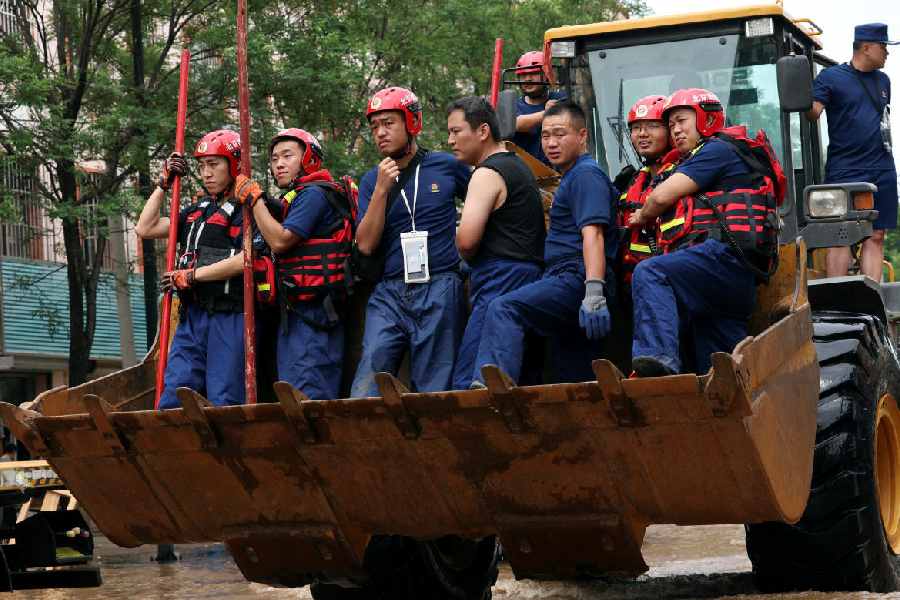The intersection is quiet at 4am, but not as quiet as one might expect. Fluorescent light radiates from all-night breakfast stalls. People, mostly men, loiter in small groups on the sidewalk, silently eating steamed buns. Everyone seems to be waiting.
Around 4.30, the first rays of sun appear, and it becomes clear what everyone was waiting for.
Job recruiters ride up on electric scooters and, without getting off, start shouting out day rates — 170 yuan! 180! (That’s about $25.) The early risers swarm around them to hear what’s on offer: gigs pouring concrete on construction sites, or packaging bottled drinks, or cleaning buildings. From cheap dormitories nearby, more workers, men and women, stream out. By the time the sun is up, this intersection in Majuqiao, a neighbourhood on the southern outskirts of Beijing, is full of hundreds of people.
This is Beijing’s largest day labour market, where people from around the country gather every morning for a chance at a hard day’s work. The lucky ones are whisked off in minivans, some with their own hard hats or mops in tow. The unlucky ones keep waiting for the next recruiter, or they go home. By 8am, the crowd has already thinned — people’s fates, at least for that day, decided.
Scenes like this have been unfolding for decades across China, as workers have flocked from the countryside to cities, powering the country’s rise. The markets are places for new arrivals to find a foothold and begin working for a better life. “If you run into hard times, go to Majuqiao,” says a well-known expression in Beijing.
But China’s economy is slowing. And there seem to be more hard times than Majuqiao can handle. The real estate market is struggling, so construction sites are hiring fewer people and paying them less. Factories want younger and more specialised workers. That means many older labourers are being left out in the cold.
The slowdown shows up not only in fewer jobs, but also in the market’s thinning crowds and the makeshift places people call home. On telephone poles, fliers advertise shared rooms for as low as $3 a night. Still, under faded signs for cellphone repair shops and dumpling stalls, some people sleep on the streets.
The market’s soundtrack consists of bursts of negotiations with recruiters, over a lower hum of resignation.
“Anyone want to be an actor?” called out a man on a scooter. He was looking for women, ages 16 to 50, to be extras on a film set.
A crowd pressed in around him, demanding to know how much it would pay (about $14), for how long (two to three hours) and whether they’d have to get to the set, about an hour away, on their own (yes). Most of the women walked away, grumbling that it wasn’t worth it. The recruiter shrugged and nosed his scooter to another spot in the crowd.
One of the women who walked away was Wang Liyuan. With her ponytail and energetic voice, Wang exuded a youthful air. But the problem was that at 43, she wasn’t youthful anymore, at least not by recruiters’ standards.
“At 40, you’re already retired,” she said.
Wang started coming to the market after she was let go in 2022 from her job making pills at a pharmaceutical factory — because, she said, of her age. But that was the same reason she struggled to find a new job. After years at the factory, her feet hurt badly if she stood for long stretches. She had not graduated from middle school, while younger competitors all had high school degrees.
Even construction sites have grown picky: “They choose people like they’re choosing concubines: Are you a good worker? Are you efficient?” said Wang, who is from the northeastern province of Heilongjiang.
Despite being at the market almost daily, Wang said she generally found work only four or five days a week. She earned $25 on the best days; the year before, jobs not only paid a few dollars more, but also included meals. She had stopped making pension and medical insurance payments, worried that the funds would run out of money by the time she was eligible. She had also cut down on the allowance she gave her 13-year-old son, who was in Heilongjiang with his grandparents.
“Originally, I wanted to give my son a bit of a better life,” Wang said. “So much for that.”
Still, Wang had her standards. When a man walked by advertising a job unloading postal trucks for 12 hours for about $22, she waved him off.
“I know that job,” she said. (She had also worked on construction sites, as a cleaning lady and as a spa attendant.) “You have to do whatever they tell you, they give you only half an hour to eat and you can’t sit.”
Indeed, though nearly everyone at Majuqiao lamented their grim job prospects, many workers said they would not take just any job — a reflection of how, as China’s living standards have improved, workers’ expectations have increased.
Huo Shuxia, who had been coming to the market for four years, said she preferred day gigs over her previous job at a book warehouse. Yes, gig work was unstable: She estimated that she found work only half the month. She paid about $84 a month for rent, and budgeted $2.50 a day for food. She was carrying a plastic bowl and chopsticks in a bag, which she would bring to her work site of the day, a printing factory.
But she had more freedom. She could take a day off whenever she wanted. If she needed to go home to see her family, she could. There was also less chance of a boss docking wages arbitrarily.
New York Times News Service











